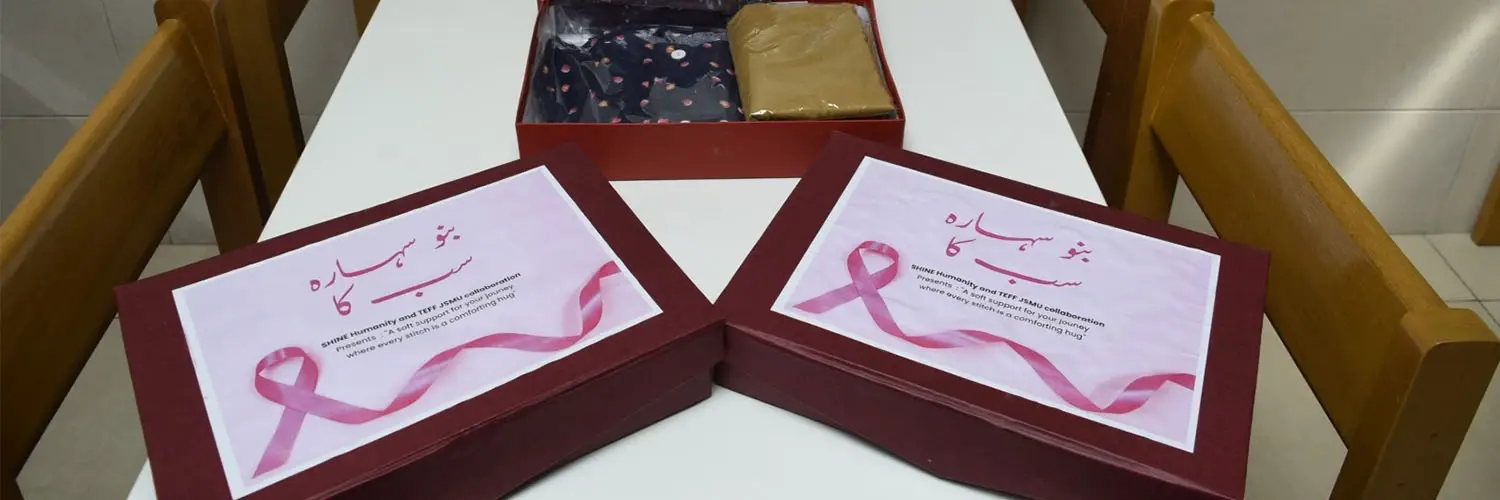Breast Cancer in Young Women: Recognizing the Signs and Taking Early Action
Breast cancer is a growing concern globally, but its rise among younger women, especially those under the age of 40, is particularly alarming. In Pakistan, where awareness about the disease remains low, breast cancer in young women is becoming more common, often going undetected until it's too late.
Unfortunately, younger women tend to develop more aggressive forms of breast cancer, leading to higher mortality rates if not detected early. However, understanding the signs and taking proactive steps can make a life-saving difference.
A Growing Concern
In Pakistan, around 90,000 new breast cancer cases are reported annually, and approximately 40,000 women lose their lives to the disease. Of these, a growing number are young women under the age of 40, a trend that has caused great concern in the medical community. While older women remain more susceptible, breast cancer in young women can have a profound emotional and psychological impact, leading to unique challenges related to their body image and self-confidence.
Why Secondary Breast Cancer is on the Rise in Pakistan
Secondary breast cancer, or metastatic breast cancer, develops when cancerous cells migrate from the breast to other body parts, such as the lungs, bones, liver, etc. Pakistan is one of those countries where secondary breast cancer is on the rise and several factors are attributed to it, such as:
Late Diagnosis and Delayed Treatment: Cultural stigmas, lack of awareness, and fear of diagnosis lead many women to delay seeking medical attention, resulting in cancer being diagnosed at advanced stages. This percentage of delayed treatment is higher in the rural side of Pakistan. A study from 2020 highlighted that 70-80% of breast cancer cases in rural Pakistan are diagnosed at later stages (Stage III or IV), compared to 40-50% in urban areas.
Lack of Advanced Treatment Facilities: Pakistan lacks a sufficient number of hospitals equipped with specialized oncology services, such as chemotherapy, radiation therapy, and targeted treatments. Most advanced treatments are available only in urban hospitals, requiring patients to travel long distances.
Urbanization and Lifestyle Changes: The growing trend of reduced breastfeeding, consumption of unhealthy food, and exposure to environmental pollutants, such as agricultural pesticides, increase the risk of breast cancer in young women.
Genetic and Biological Factors: Some women are born with mutations in the BRCA1 or BRCA2 genes, which increase the risk of breast cancer. Unfortunately, genetic testing is not widely available in Pakistan, preventing early detection of high-risk individuals.
Understanding Breast Cancer Stages
Recognizing the Early Signs of Breast Cancer
In Pakistan, the early signs of breast cancer in young women often go unnoticed. Delayed diagnoses are often a result of cultural stigmas, limited awareness, and inadequate healthcare access, particularly among younger women who may not perceive themselves to be at risk. Common early symptoms include:
A persistent lump in the breast or armpit
Changes in breast shape or size
Dimpling or puckering of the breast skin
Discharge not related to breastfeeding
Unexplained breast pain
Self-Examination for Breast Cancer
While clinical screenings are essential, self-examination for breast cancer is a simple and effective way for women to stay aware of any changes in their breasts. Here's how to perform a self-exam:
Begin in Front of a Mirror: Look for any visible changes in size, shape, or color.
Raise Your Arms: Check for similar changes when your arms are raised.
Inspect the Nipples: Look for any signs of discharge or change in position.
Feel for Lumps Lying Down: Use circular motions to feel for lumps with your hand.
Check for Lumps in the Shower: Feel for lumps standing or sitting, covering the entire breast and armpit areas.
Breast Cancer Awareness Month
October is recognized worldwide as Breast Cancer Awareness Month, during which many hospitals and healthcare organizations conduct awareness campaigns and provide free mammogram services. These screenings are crucial, as a mammogram in a private hospital typically costs PKR 15,000 to 25,000, making it unaffordable for many women. This initiative encourages more women, especially from rural areas, to undergo screening and catch the disease early when it's more treatable.
What Actions Need to Be Taken?
Increase Awareness: More comprehensive efforts are needed to increase breast cancer awareness in young women through nationwide campaigns.
Improve Access to Screening: Expanding free or subsidized mammograms in rural and underserved areas.
Provide Genetic Testing: Access to genetic testing for high-risk women should be made available to detect BRCA mutations.
Expand Support Systems: Offer more support for breast cancer patients, especially those in remote areas, including emotional and financial assistance.
At SHINE Humanity, we are dedicated to improving healthcare access for underserved communities by providing essential medical services and resources. In line with this mission, we are committed to raising breast cancer awareness and supporting early detection efforts.
In 2023, we organized breast cancer awareness sessions for our employees at our Head Office and at the SHINE Garibsons Clinic in Gharo, focusing on educating staff and patients about recognizing early signs of breast cancer. These sessions provided crucial information on symptoms, early detection methods, and the importance of self-examination for breast cancer. Additionally, we also launched a special initiative to support breast cancer patients by providing customized treatment gowns, designed to enhance comfort and confidence during treatment. These gowns not only alleviate the burden on patients, who would otherwise need to purchase or stitch them, but also reflect our commitment to enabling every individual to live a healthy life.
Join Us in Making a Difference
By supporting our efforts to fight breast cancer in Pakistan, you can make a meaningful and lasting difference in the lives of those battling the disease. Together, we can help young women recognize the early signs of breast cancer and take timely action to save lives. Visit SHINE Humanity to discover more about our initiatives and find out how you can help support this life-saving mission.
Let's fight breast cancer together and give hope to those in need.
